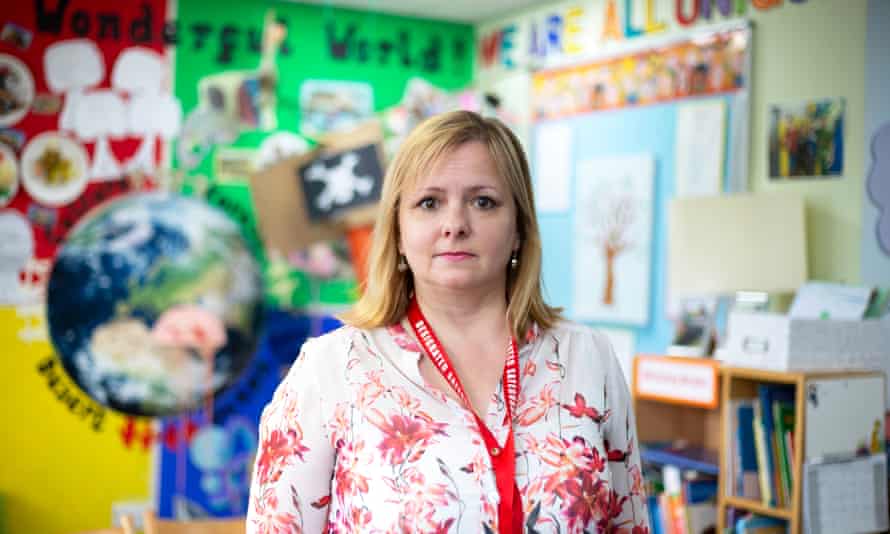At St Jude’s, a small Church of England primary school in south London, the morning breakfast club is exceptionally busy. Over the past six weeks the number of pupils coming in to have porridge, scrambled egg and fruit smoothies before the school day begins has climbed from eight to 22 – nearly a quarter of the Southwark school’s population.
Families hit by the cost of living crisis are increasingly desperate, says the acting deputy head, Matt Jones. They need help with their debts; they can’t pay their bills. Staff are making more and more referrals to StepChange, a debt charity, and the school has made discretionary payments to help families unable to afford gas, electricity or nappies.
Budgets are tight, says Jones, but the school is determined to protect quality school dinners for its children, come what may. “We are taking a stance,” he said. “For many of our children, the food they get at our school might be the one decent meal they get each day. So we’ve got to make sure it continues.”
As inflation sends the cost of ingredients spiralling, suppliers have told schools they are doing everything they can to absorb rising costs, but at some point the increases will have to be passed on. Without additional funding from the government, schools may have to opt for smaller portions or cheaper ingredients.
The rapid increase in costs is shocking. One school catering manager in Liverpool said 5kg of long grain rice rose from £6.49 in April to £8.30 in May, 5kg of fresh chicken fillet went up from £19.96 to £28.53, and 1.7kg of tinned tuna in brine rose from £6.99 to £8.07.
Some schools are considering putting up the price of school lunches next term for those who pay, but they are reluctant to increase the burden on families already caught in the cost of living crisis.

Helen Stout is the headteacher of Meadowfield primary school in Halton Moor, Leeds, where many parents are already struggling to feed their children. The school serves a disadvantaged community where some families have been held back by generations of worklessness.
More than 60% of her pupils are eligible for free school meals and the school provides breakfast for all children every day – “bread and spread” to make sure stomachs are not entirely empty at the start of the day. There are, however, worrying signs of hunger, Stout says. “Members of staff say children are gorging on food in the morning.”
Meadowfield is still providing food parcels for the families most in need – a legacy of lockdown – with the help of a charity called Rethink Food, which intercepts food that is just past its sell-by date and destined for landfill. “It’s all perfectly fine to be eaten. It comes to us and we bag it up,” Stout said. Staff have also been directing parents to a charity called Zarach for basic items such as bedding, beds and mattresses.
The school has already decided – reluctantly – to stop funding milk for its 200 key stage 2 children at the end of next week. “The cost has become astronomical,” Stout said, “but [the decision] sits uneasily with me.”
She is horrified at the suggestion that children might be given smaller school lunches made with cheaper ingredients because of rising costs. “For some of my pupils, we know that it’s the only hot meal they are getting a day. I would have hoped school dinners would be sacrosanct. We can’t educate them if they’re hungry.”
At Meadowfield, like many schools, there are other telltale signs that families are struggling – in children’s personal hygiene and appearance. Children come in without socks, while others are wearing school uniforms that are old and have been handed down not just once but through a couple of siblings.
Dr Paul Gosling, the headteacher at Exeter Road community primary school in Devon, and president of the National Association of Head Teachers (NAHT), said his school was struggling to absorb the impact of rising food costs to protect families.
“We have held off increasing the cost of meals to paying families as it will be another pressure on them. At the moment the school is absorbing the increased cost but it is not sustainable.”
Stay connected with us on social media platform for instant update click here to join our Twitter, & Facebook
We are now on Telegram. Click here to join our channel (@TechiUpdate) and stay updated with the latest Technology headlines.
For all the latest Education News Click Here
For the latest news and updates, follow us on Google News.
